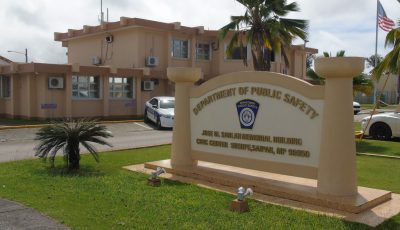Hartig doubts elected DPS commissioner is best approach
Chief Public Defender Douglas Hartig has expressed doubt that having an elected commissioner of the Department of Public Safety is necessarily the best approach.
“I don’t know that this proposed change gets you where you want to go,” said Hartig in his testimony concerning a House of Representatives legislative initiative that proposed to amend the CNMI Constitution and make the DPS commissioner an elected position.
House Legislative Initiative 22-01 was among the legislations and proposed rules that were discussed during a public hearing conducted by the House Judiciary and Governmental Operations Committee chaired by Rep. Celina R. Babauta (D-Saipan) at the Pedro P. Tenorio Multi-Purpose Center in Susupe last week, Thursday.
The legislative initiative was authored by Rep. Edwin K. Propst (D-Saipan), who was present at the public hearing. Propst is a known critic of DPS Commissioner Robert A. Guerrero.
If House Legislative Initiative 22-01 passes the Legislature, the question will be put to a vote and CNMI voters will decide whether or not they would like to elect the DPS commissioner.
Hartig said he does not know that an elected chief of police is necessarily the best approach.
As it stands now, Hartig said, the commissioner can be relieved by the governor or by impeachment.
The chief public defender said this proposal would make it only by impeachment so actually it does not increase oversight.
“You’ve cut it by 50%. I don’t really think that gets you where this proposal is trying to go,” Hartig said.
He said the way it works for the federal government in the United States, it is in fact the chief executive, the president, who appoints the chief of the law enforcement, the functional equivalent would be the head of the Federal Bureau of Investigation.
“And it seems to work pretty well in the United States. And there doesn’t seem to be much interference, which apparently, this committee is concerned about,” Hartig said.
Propst stated in the legislation that it is critical for DPS to be free of political influence and interference as enforcers of law and order.
Propst said unfortunately, this has not been the case, as the present system gives the governor the power and authority to choose and appoint the DPS chief.
The lawmaker said the commissioner serves at the will of the governor, serves as a Cabinet member of the governor, and essentially follows orders from the governor.
Hartig said the fact also that the elected official would run not affiliated with a political party, but someone who’s otherwise qualified, been in law enforcement for five years, a resident here for five years, is of a certain age, is going to be hard to find that person.
He said they can’t announce party affiliation, but everybody knows who they are, and what their party is even though it’s not stated on a ballot.
“So I don’t think that totally overcomes that issue,” the chief public defender said.
“Also, when you run, appealing to a certain constituency, it lends itself to pandering. You could find that an elected official really doesn’t want to be the commissioner. He’s looking for Commonwealth-wide exposure for a different office,” he said.
Hartig said this could work to the detriment of certain groups, certain subgroups in the Commonwealth.
“For example, the residents of Rota. We’re not going to bother funding Rota because they don’t have enough votes when I [going to] run for higher office so forget Rota. That’s just an example, which is conceivable,” he said.
Hartig said he is not sure that making this DPS commissioner an elected position really gets over the problem that is potentially perceived.
“And again, it’s not the way it’s done in the federal government which I think is probably a better model,” he said.
Hartig said a third model, which is very common in urban areas and large police departments, is a board.
“If you have a board that has a member appointed for a fixed term of years from the governor, other members who are elected, other members who are appointed that are overlapping but not continuous or contiguous terms so that different governors will be appointing different board members, you have a board, which at least in principle, and I think in practice would be much more neutral,” he said.
Hartig said he believes that the board model is the better model than the elected model.



























